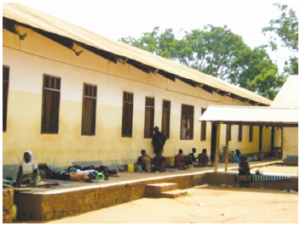 By Gift Friday
By Gift Friday
It is a tale of a medical facility in an Intensive Care Unit. While it is expected to save the lives of people living in the expansive Yambio state, the Yambio State Hospital is itself in dire need of a comprehensive facelift to meet standards for operations.
The facility is faced by an acute shortage of vital facilities and can hardly cope with the high number of patients. It has only four functional departments, according to a senior doctor at the facility, Dr Munadil Atif. He disclosed that only the Surgical Department with two theaters, the pediatric department, the maternity and medical department are functional. The health facility, he said, has only 6 general doctors and practitioners, and 43 nurses among whom only four are certified and registered. “We lack buildings to accommodate medical personnel, specialists and consultants, forcing us to refer many cases to the Juba teaching Hospital,” he said. The hospital’s X-ray, ultra sound and dental machines, scanners and eye care departments were not functional.

But he said the situation was set to improve after an international medical organization – Medicines sans Frontiers (MSF) – sent a group of medical experts to the hospital to help patients. The MSF, Dr Atif said, had also donated drug supplies to the health facility.
However, the doctor who has spent three years in Yambio, refuted reports that the hospital had high mortality rates. “In 2010 we made 422 deliveries in Yambio state hospital, of which there were severe complications with 69 but, no single mother died” he said. He added: “The mortality rate in Western Equatoria over the past few years is less than 0.4 % which has never happened anywhere. There were about 455 major operations done in the state hospital, and no single death was recorded despite working with limited resources.” The doctor said that over 40,000 people were treated at the hospital last year.
He asked the Government of Southern Sudan to post more doctors and deliver more facilities at the hospital, which is located in Western Equatoria.
The hospitals’ Matron, Teresa Dabi, said, the state hospital’s security remained poor since it had no fence, putting the lives of staff and patients at risk. “To make matters worse, the whole hospital does not have stretchers, shelter for patients, no emergency ward, and no ambulance” she said. Teresa who has worked at Mulago Hospital in Kampala, in Khartoum and many parts of Sudan said that unlike in other hospitals, doctors working in Western Equatoria had no risk allowances. She stated that the hospital has a capacity of only 120 beds – a very small number for a state hospital.
A doctor working with the MSF, Dr Francisco Bartalomer, said his team decided to help the hospital after seeing its deplorable condition. He said MSF was currently working at the surgical department, maternity and the pediatric department. They are also supplying stationary to the hospital for record keeping.
The hospital also lacks a drug store and laboratory equipment, according to its administrator, Mr Samuel Bambise. The hospital was initially managed by CORDAID, a Non Governmental Organization run by the Catholic diocese of Tambura-Yambio from 1994-2005. The administrator said the hospital had no mains electricity and uses a generator to light up its facilities. The MSF, he added, had also helped to construct latrines at the facility.
But despite the problems facing the hospital, patients put up a brave face, hoping that their conditions will improve. One of the patients, Enoka Ephraim said the services were not very good. “We come to this hospital for medical prescriptions and get our drugs from private clinics which are very expensive,” he said. Another patient, Roseline Margaret, a mother, expressed her dismay that the hospital does not have enough syrups for small children. Margaret says she walks long distances to the hospital and that it takes long hours to access the services in the hospital because there are many patients,” she said.